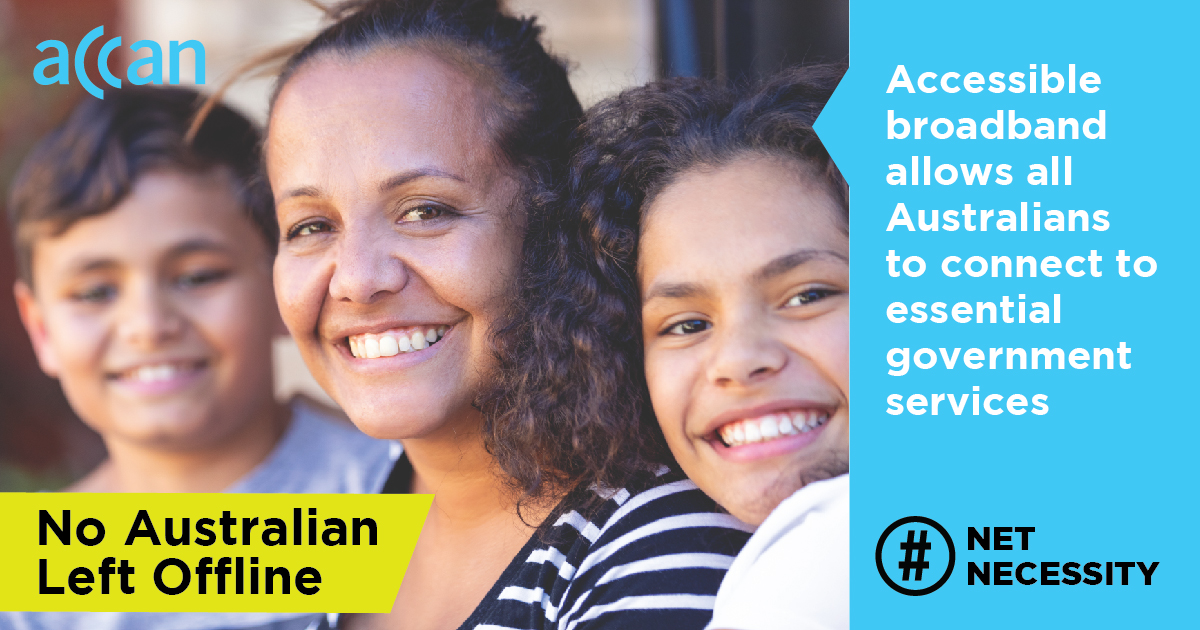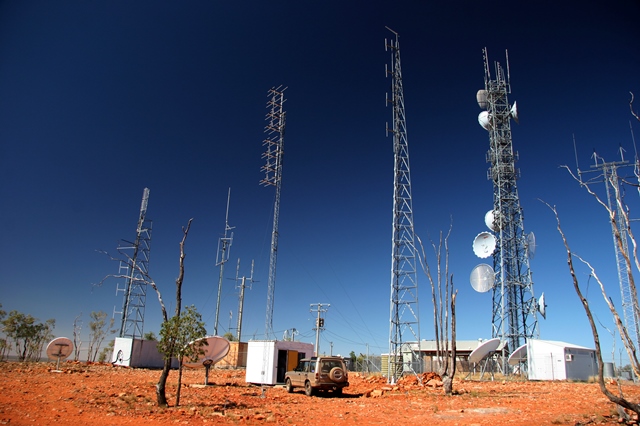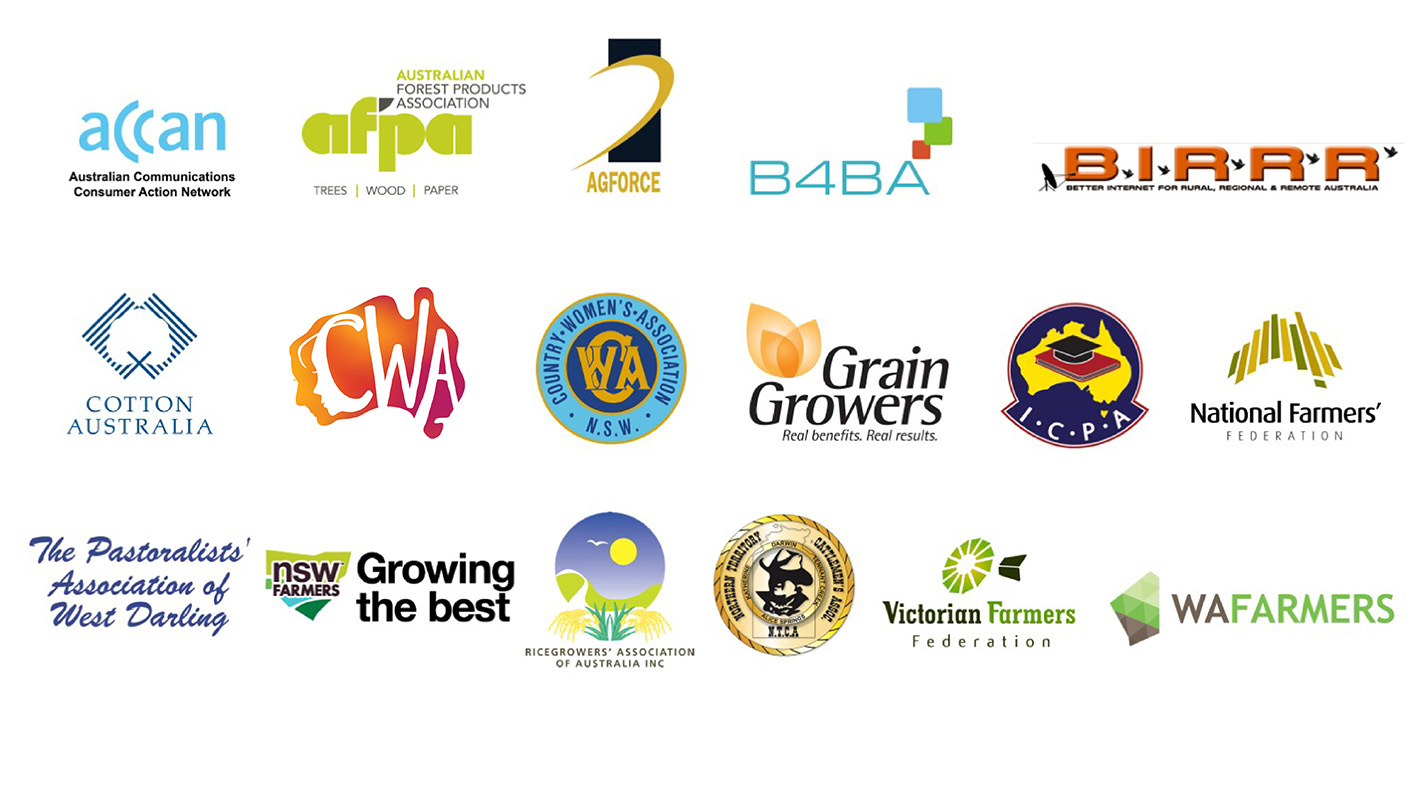Key Dates
Next Grant Round:
Applications for funding will open early 2025.
> Information about our Grants Program
Independent Grants Panel:
Results of the recent EOI will be notified Dec 2024.
> Information about our Panel
We can help: grants@accan.org.au
or phone 02 9288 4000
Subscribe to Grants Program mailings
The Regional, Rural and Remote Communications Coalition (RRRCC) welcomed this morning’s announcement from Telstra about a program of works it is undertaking to bolster landline services in regional, rural and remote Australia.
Telstra’s announcement addresses some of the issues around reliability of landline services identified in the November 2018 report of the Regional Telecommunications Review, such as extended faults and repair times for some Telstra customers in regional, rural and remote Australia.
ACCAN has made a submission to the Governments Future of Broadcasting consultation on a Connected Television Prominence Framework. The consultation suggested a range of proposals which would support the policy intent of making Australian local television services prominent and easy to access on connected devices capable of displaying television programming.
Read more: Future of Broadcasting: Connected Television Prominence Framework February 2023
ACCAN has written to the major political parties (the Liberal Party, the Australian Labor Party, the Nationals and Australian Greens) to raise awareness of the need for politicians and government agencies to ensure that all of their online video content is accurately captioned. See below for a copy of this letter.
YouTube has a function that auto-captions videos uploaded to the site, but these captions are often inaccurate. Videos that are uploaded to Facebook often have no captions.
One in 6 Australians suffer from hearing loss; that’s 1 in 6 consumers who are not able to access online videos due to unreadable captions or a lack of captions. Access to information is especially important during the lead up to the 2016 Election. If videos are not properly captioned then many consumers will miss out on important information.
Read more: Online videos need to be properly captioned
Write comment (0 Comments) A new affordable home broadband product for financially stressed Australians on low incomes should be a key priority for political parties ahead of the 2019 Federal election, according to consumer organisation ACCAN.
A new affordable home broadband product for financially stressed Australians on low incomes should be a key priority for political parties ahead of the 2019 Federal election, according to consumer organisation ACCAN.
Australia’s peak body representing telecommunications consumers, ACCAN, is urging the nation’s political parties to consider a proposal for a wholesale broadband concession that would provide financially stressed Australians with cheaper home broadband.
ACCAN considers that a 50 mbps unlimited broadband service offered at a wholesale price of $20 per month by NBN Co to households receiving government financial support to be the most effective way to achieve affordable broadband for all. This would mean eligible households would pay approximately $30 per month for unlimited broadband – almost halving the current average cost.
Initial estimates indicate that providing this concession to the 1 million plus households on the lowest incomes can be budget neutral.
Read more: No Australian Left Offline: ACCAN pushes for affordable broadband
ACCAN recently responded to The Treasury’s Regulating Buy Now, Pay Later in Australia consultation on the future regulatory framework for buy now, pay later (BNPL) arrangements under the National Consumer Credit Protection Act 2009 (the Credit Act). In our submission we endorsed the joint consumer submission to this consultation led by Financial Rights Legal Centre.
 Recently ACCAN has heard increasing reports about fraudulent mobile number porting and identity theft.
Recently ACCAN has heard increasing reports about fraudulent mobile number porting and identity theft.
What is a mobile number porting scam?
Fraudulent mobile number porting happens when a scammer uses your personal details to port your mobile number from one provider to another. Scammers can get access to your personal details, such as your date of birth, phone number and address, via your social media profiles.
Read more: Fraudulent mobile number porting and identity theft
Write comment (78 Comments) Australians are being put at risk due to inadequate consumer protection frameworks around the reliability of telecommunications services, ACCAN has warned the Government’s latest Consumer Safeguard Review.
Australians are being put at risk due to inadequate consumer protection frameworks around the reliability of telecommunications services, ACCAN has warned the Government’s latest Consumer Safeguard Review.
Read more: Telco accountability is key for Consumer Safeguards Review: ACCAN
ACCAN has responded to The Treasury’s Digital Platforms: Government consultation on ACCC’s regulatory reform recommendations Consultation Paper. In our submission we supported the introduction of:
Read more: Digital Platforms: Government consultation on ACCC’s regulatory reform recommendations...
 Last year Queensland Remote Aboriginal Media (QRAM), in conjunction with ACCAN, released what is believed to be the first consumer resources produced in Indigenous languages.
Last year Queensland Remote Aboriginal Media (QRAM), in conjunction with ACCAN, released what is believed to be the first consumer resources produced in Indigenous languages.
Working with design agency, Gilimbaa, QRAM created a series of audio tracks with information on what you should think about before buying a mobile phone, how to keep internet and phone costs low, what people can do if they get a large or unexpected bill and more. The project also produced a series of colourful posters that cover the same issues.
Read more: Indigenous consumer education
Write comment (0 Comments) The Regional, Rural and Remote Communications Coalition (RRRCC) has welcomed the recommendations of the 2018 Regional Telecommunications Review: Getting it right out there.
The Regional, Rural and Remote Communications Coalition (RRRCC) has welcomed the recommendations of the 2018 Regional Telecommunications Review: Getting it right out there.
The report is the culmination of submissions and consultative forums held across regional, rural and remote Australia to resolve the connectivity issues facing our communities now and into the future.
Read more: Time is now for new investment in bush telecommunications
ACCAN has responded to an ACCC consultation on NBN Co’s proposed variation to its Special Access Undertaking (SAU). The SAU sets out the rules by which NBN Co provides wholesale access to retailers. The SAU can determine price and quality of voice and broadband services delivered over the NBN until 2040.
The SAU variation lodged by NBN Co in November 2022 represents a significant step forward compared to its previous Variation. There are many aspects of the latest proposal that ACCAN supports such as the shift to a flat rate pricing construct, the reduction of the Initial Cost Recovery Account, the Replacement Module Application process, and the introduction of the Weighted Average Price Cap.
 ACCAN welcomes the Morrison Government’s commitment to preserve the current Universal Service Obligation (USO) arrangements to guarantee fixed voice services to Australians, however stresses the urgency in extending guarantees to include broadband services through legislation.
ACCAN welcomes the Morrison Government’s commitment to preserve the current Universal Service Obligation (USO) arrangements to guarantee fixed voice services to Australians, however stresses the urgency in extending guarantees to include broadband services through legislation.
The USO refers to the obligation to ensure that all Australians can access a Standard Telephone Service, regardless of where they live or work. Telstra is currently contracted to deliver this obligation and uses a range of technologies to do so, including its fixed copper network, and radio and wireless services.
Read more: ACCAN welcomes USO preservation, pushes for broadband inclusion through legislation
ACCAN has provided feedback on the ACCC’s record keeping rule (RKR) for NBN’s service performance.
ACCAN supports the proposal which will require NBN Co to submit service quality and network performance metrics to the ACCC, where the ACCC will publicly report on the information collected.
ACCAN considers that the RKR should be amended to:
Read more: Record Keeping Rule – NBN Service Performance Consultation Paper
 Amending the Broadcasting Services Act to introduce audio description on free-to-air TV is one of ACCAN’s 2016 communications consumer priorities. Introducing audio description on Australian TV would provide greater access for consumers who are blind or vision impaired. Currently there is no audio description on Australian free-to-air TV.
Amending the Broadcasting Services Act to introduce audio description on free-to-air TV is one of ACCAN’s 2016 communications consumer priorities. Introducing audio description on Australian TV would provide greater access for consumers who are blind or vision impaired. Currently there is no audio description on Australian free-to-air TV.
Audio description is additional verbal narration that describes visual elements shown on screen during pauses in dialogue. It can describe elements such as scenes, costumes and actions.
Read more: Update on audio description
Write comment (0 Comments) Regional, rural and remote Australians will be better protected if recommendations put forward by the 2018 Regional Telecommunications Review are adopted, according to Australia’s peak body representing telecommunications consumers, ACCAN.
Regional, rural and remote Australians will be better protected if recommendations put forward by the 2018 Regional Telecommunications Review are adopted, according to Australia’s peak body representing telecommunications consumers, ACCAN.
The report recognises the essential nature of communications in everyday life, and the necessity of improving access to telecommunications infrastructure, consumer protections and digital literacy for regional, rural and remote Australians.
Read more: ACCAN calls on Government to adopt Regional Review recommendations
ACCAN recently submitted to the Department of Infrastructure, Transport, Regional Development, Communications and the Arts’ consultation on the Regional Connectivity Program Round 3 (including Mobile Black Spot opportunities) Grant Opportunity Draft Guidelines. In our submission we recommended:
Read more: Regional Connectivity Program Round 3 Grant Guidelines
 The cotton industry is an integral part of the Australian economy, worth more than $1.5 billion in export earnings for the 2015-16 season and employing on average 10,000 people.
The cotton industry is an integral part of the Australian economy, worth more than $1.5 billion in export earnings for the 2015-16 season and employing on average 10,000 people.
Cotton Australia, the peak industry body for Australia’s cotton industry, is one of ACCAN’s newest members. The organisation is also a member of the Regional, Rural and Remote Communications Coalition.
As a member of both ACCAN and the Coalition, Cotton Australia has highlighted telecommunications issues many cotton growers experience, including poor to no mobile service, unreliable internet services with speeds and data caps that often mean growers struggle to send an email, let alone capitalise on all the benefits of ‘smart’ agriculture.
Read more: Reliable telecommunications a necessity for Aussie cotton farmers
Write comment (0 Comments)Australian Communications Consumer Action Network (ACCAN) has today launched Australia’s first independent information resource for telecommunications products suitable for people with disability.
Known as the Accessible Telecoms project, the interactive website and call centre will be the much needed one-stop shop for information about the accessibility features of both mainstream and assistive telecommunications equipment suitable for people with disability. It is made possible thanks to a National Readiness grant from the National Disability Insurance Agency (NDIA).
As Australia’s peak body representing communications consumers, ACCAN has been advocating for a service that will eliminate the growing information vacuum about equipment and services suitable for people with disability in our increasingly digitally connected society.
ACCAN recently submitted to the Senate Standing Committee on Environment and Communications on the Telecommunications Legislation Amendment (Information Disclosure, National Interest and Other Measures) Bill 2022 (the Bill).
ACCAN’s submission set out our support for the Bill and in particular:
 March 15 is World Consumer Rights Day (WCRD). WCRD is an opportunity to promote the basic rights of all consumers, demanding that those rights are respected and protected, and a chance to protest against the market abuses and social injustices which undermine those rights.
March 15 is World Consumer Rights Day (WCRD). WCRD is an opportunity to promote the basic rights of all consumers, demanding that those rights are respected and protected, and a chance to protest against the market abuses and social injustices which undermine those rights.
The theme for WCRD 2017 is ‘Building a Digital World Consumers can Trust.’ To tie into this theme, this blog looks at where consumers can turn to when they need to make a complaint, get advice or report scams and cyberbullying.
Read more: Building a Digital World Consumers can Trust
Write comment (0 Comments) The Regional, Rural and Remote Communications Coalition (RRRCC) welcomes the recommendations of the Joint Standing Committee on the National Broadband Network’s inquiry into the rollout of the NBN in rural and regional areas.
The Regional, Rural and Remote Communications Coalition (RRRCC) welcomes the recommendations of the Joint Standing Committee on the National Broadband Network’s inquiry into the rollout of the NBN in rural and regional areas.
In December 2017, the bipartisan committee announced that it would conduct a review of the NBN, focusing on the capacity and reliability of NBN satellite, fixed wireless and fixed line networks.
Read more: Bush communications coalition welcomes report into rural and regional NBN
ACCAN recently submitted to Communications Alliance’s consultation on DR C647:2022 NBN Access Transfer Code.
ACCAN supports the amendments proposed in the draft code, which will facilitate the efficient transfer of NBN services. The proposed amendments will support the verification and transfer process and provide benefits by:
 To find out more about the communications policies of the major political parties we have posed questions to them on these communications consumer priorities and other important issues. When the answers to our questions are available we will post them on this webpage. More information on communications consumer priorities is available on our Election webpage.
To find out more about the communications policies of the major political parties we have posed questions to them on these communications consumer priorities and other important issues. When the answers to our questions are available we will post them on this webpage. More information on communications consumer priorities is available on our Election webpage.
Read more: Federal Election questions to major parties
Write comment (0 Comments) The Regional, Rural and Remote Communications Coalition (RRRCC) welcomes the proposals flagged in a Department of Communications and the Arts consultation paper which focuses on the reliability of telecommunications services.
The Regional, Rural and Remote Communications Coalition (RRRCC) welcomes the proposals flagged in a Department of Communications and the Arts consultation paper which focuses on the reliability of telecommunications services.
Read more: RRRCC supports steps to improve reliability of telco services
